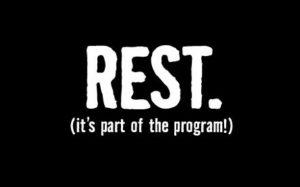In the exhilarating world of extreme sports, where adrenaline surges and boundaries are continually pushed, athletes often find themselves in a relentless pursuit of peak performance. Yet, amid the thrill of high-speed descents and gravity-defying maneuvers, lies a crucial component of athletic success that is often overlooked: the rest day. While it may seem counterintuitive to pause in a sport defined by momentum, embracing rest days is not just a break from the action—it’s a vital strategy for preventing injuries and enhancing long-term performance. By understanding the profound impact of rest on the body and mind, athletes can harness the power of recovery to not only stay in the game but to excel in it. Join us as we explore how integrating rest days into training routines can unlock greater potential, ensuring that passion for extreme sports remains both thrilling and sustainable.
Understanding the Science Behind Rest and Recovery
Embracing the art of rest is not just about taking a break but is a scientifically backed strategy that fuels performance and minimizes the risk of injuries in extreme sports. During intense physical activities, our muscles undergo stress and microscopic damage. Rest days allow the body to repair and rebuild stronger muscle fibers, enhancing overall strength and endurance. Cortisol levels, a stress hormone, are also regulated through adequate rest, reducing inflammation and promoting mental clarity.
To maximize the benefits of rest, consider incorporating the following practices:
- Active Recovery: Engage in light activities like walking or yoga to maintain blood flow without straining the muscles.
- Hydration and Nutrition: Ensure proper intake of fluids and nutrients to aid in muscle repair and energy replenishment.
- Sleep: Prioritize quality sleep as it is crucial for the release of growth hormones that facilitate tissue repair.
- Mindfulness and Relaxation: Techniques such as meditation or deep-breathing exercises can reduce stress and accelerate recovery.

Key Benefits of Rest Days for Enhanced Performance and Injury Prevention
Embracing rest days as an integral part of your training routine can significantly elevate your performance and safeguard against injuries. Rest days allow your body to repair and rebuild, fostering muscle growth and enhancing strength. This recovery period helps to replenish energy stores and reduce muscle fatigue, preparing you for the challenges of your next workout session. By integrating adequate rest, athletes can maintain consistent progress and avoid the plateau effect that often accompanies continuous exertion.
- Enhanced Muscle Recovery: Resting gives muscles the opportunity to recover and grow stronger, reducing the risk of strains and sprains.
- Mental Rejuvenation: Taking a break can alleviate mental fatigue, keeping your motivation and focus at peak levels.
- Injury Prevention: Consistent rest helps in identifying minor aches before they develop into serious injuries.
- Improved Performance: Well-rested athletes often experience improved agility, speed, and endurance.
Incorporating these restorative days into your routine is not just a suggestion; it’s a strategy for longevity and success in any athletic endeavor. With this balanced approach, you’re not just resting—you’re setting the stage for your next victory.

Practical Tips for Incorporating Rest Days into Your Training Routine
Incorporating rest days into your training routine doesn’t have to be a guessing game. Here are some practical tips to help you strike the perfect balance between exertion and recuperation:
- Listen to Your Body: Pay attention to signs of fatigue or soreness. If you feel unusually tired or notice persistent muscle aches, it’s your body signaling for a break.
- Schedule Regular Rest Days: Plan rest days into your routine, just as you would any workout. This consistency helps prevent overtraining and promotes sustainable progress.
- Active Recovery: Consider incorporating light activities such as walking, yoga, or stretching on rest days. This helps keep your body moving without the intensity of a regular workout.
- Prioritize Sleep and Nutrition: Ensure you get adequate sleep and maintain a balanced diet. Both are crucial for muscle recovery and overall well-being.
- Customize Based on Your Goals: Tailor your rest days to align with your personal fitness goals and training intensity. High-intensity programs might require more frequent rest days.
Remember, rest days are not a setback but a strategic component of your training. Embrace them as opportunities to enhance performance and safeguard your body against injuries.

Listening to Your Body: Recognizing Signs That You Need a Break
Our bodies are incredibly intuitive, often sending us signals when we’re pushing too hard or teetering on the edge of exhaustion. Recognizing these signs is crucial for athletes who aim to prevent injuries and maintain peak performance. Fatigue, both mental and physical, is one of the first indicators that you might need to step back. Ignoring it can lead to more than just a lackluster performance; it can result in serious injuries. Be on the lookout for these common signs:
- Persistent soreness or pain that doesn’t subside after a typical recovery period.
- Increased irritability or mood swings that are out of character.
- Decreased motivation to train or a lack of enjoyment in activities that usually excite you.
- Trouble sleeping or feeling unrested despite adequate sleep hours.
It’s important to remember that taking a break isn’t a sign of weakness. Rest days are a strategic part of any training regimen, helping to replenish energy stores, repair muscle tissue, and ultimately enhance performance. Listen to your body, honor its needs, and watch as you come back stronger, more focused, and ready to tackle your next challenge.










